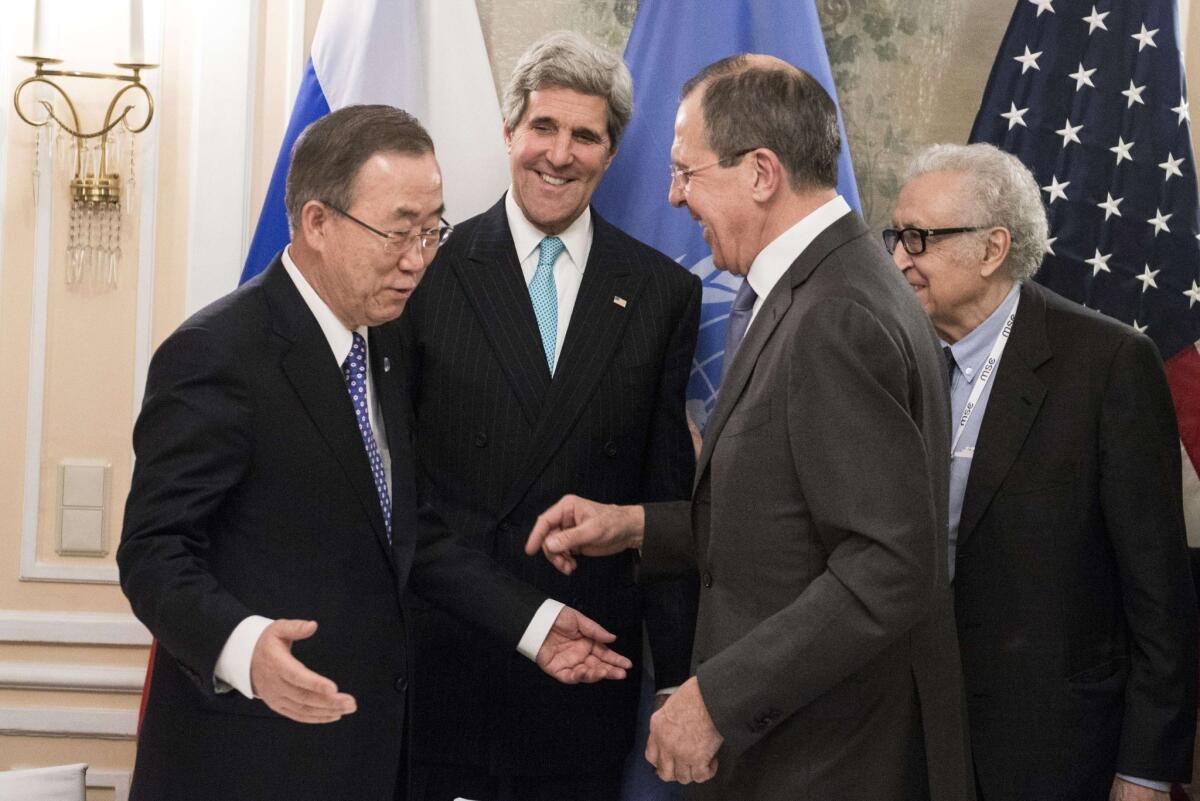Kerry warns Syria of possible U.N. action over chemical arms delay

- Share via
WASHINGTON -- Secretary of State John F. Kerry on Friday warned Syria that it could face punishment by the United Nations Security Council if it fails to surrender its chemical weapons arsenal.
However, the warning was quickly rejected by Russia, a Syrian ally and veto-wielding member of the council.
In an escalation of U.S. threats, Kerry said that if Syria breached its commitment to hand over the deadly chemicals for destruction, the issue would be considered by the Security Council under the provision of the U.N. Charter that can authorize the use of force.
“It is critical that very rapidly all of those chemicals be moved,” Kerry said during an appearance in Berlin with German Foreign Minister Frank-Walter Steinmeier.
Faced with the threat of a U.S. attack over accusations that it used the weapons against civilians, Syria committed in November to surrendering its entire arsenal by June 30. But Damascus is now months behind schedule, with less than 5% of its chemical warfare agents delivered so far, and the Obama administration this week warned that its foot-dragging was jeopardizing the disarmament deal.
Kerry noted that the accord was adopted unanimously by the council, including Russia, which helped broker the agreement. On Friday, he again urged Russian Foreign Minister Sergei Lavrov to pressure the Syrians to give up the chemicals, which include the deadly nerve agent sarin.
But Russian officials rejected the suggestion that the Security Council would consider the use of force. They said they accepted Syria’s explanation that it had been unable to ship the chemicals to the Mediterranean port of Latakia for removal because of security threats from opposition forces in the country’s civil war.
Gennady Gatilov, a deputy Russian foreign minister, said it was “counterproductive” to suggest use the of force.
“We agreed a long time ago … that there is no alternative to a political solution to the conflict in Syria,” Gatilov told the Russian news service Interfax.
Russian officials also said that Syrian rebels on Monday attacked a convoy that was trying to deliver deadly chemicals to Latakia.
Another senior U.S. official, in a conference call with reporters, also emphasized the possibility of going through the Security Council. The official, who was not identified under State Department rules, said the U.N. resolution that created the disarmament program provided that enforcement could take place under Chapter 7, the section that can authorize military force.
“If we have to go down that route, we will go down that route,” the official said.
But several former U.S. officials, including former White House arms control advisor Gary Samore, said they were skeptical that the council would authorize the use of force, because Russia and China have indicated they would veto any such action.
The Obama administration’s strongest leverage, experts say, is through the influence of Russia, which does not want the arms agreement to collapse. But since Russia appears to be content with Syria’s delay, it appears likely that what was scheduled to be a very quick disarmament could drag out over many months or years.
David Schenker, a former Middle East advisor to the Pentagon, speculated that Syria didn’t want the deal to fall apart completely because it had given Assad a measure of international respectability and made the U.S. dependent on Damascus’ cooperation. But the Syrians will want to drag out the process -- as they have in other deals with the West -- partly to show that they can stand up to the United States.
“This is vintage Assad regime,” said Schenker, who is now with the Washington Institute for Near East Policy. “We’re looking here at their playbook.”
Twitter: @richtpau
More to Read
Sign up for Essential California
The most important California stories and recommendations in your inbox every morning.
You may occasionally receive promotional content from the Los Angeles Times.











